At the end of the section about The Scott Ross Show, I mentioned that a new voice was being heard as host of the show by late in 1976. That person was Larry Black; here is his story. (Additional material from emails with Larry Black in November and December 2008.)
[DISCLAIMER: This page was written as a focus on the part of Larry Black’s career when he was doing a syndicated radio show playing Jesus music, from the late 1960s to the mid 1980s. I have added additional information about his activities before and after this time. This page is not connected directly with Larry Black and his current activities; it is primarily a “fan” page focused on this part of his radio career.
To make contact with Larry Black, try the Larry’s Country Diner page.]
Learning To Rock Around The Clock
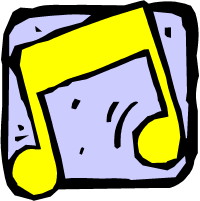 Born November 10, 1943, Larry Black grew up in Mobile, Alabama in the home of an Assemblies of God pastor. He went forward to accept Christ as his savior at a service at his father’s church when he was eight years old. As he grew up and became a teenager in the 1950s, he joined many of his age who enjoyed the new genre of rock and roll music. Larry tells it this way:
Born November 10, 1943, Larry Black grew up in Mobile, Alabama in the home of an Assemblies of God pastor. He went forward to accept Christ as his savior at a service at his father’s church when he was eight years old. As he grew up and became a teenager in the 1950s, he joined many of his age who enjoyed the new genre of rock and roll music. Larry tells it this way:
“[In the Assemblies of God] we didn’t go to movies, we didn’t skate (because that was like dancing on wheels), and we didn’t dance, and we didn’t put money in the jukebox, because that was throwing money away. So, I would get a quarter, and Dad’s church was on Michigan Avenue in Mobile, Alabama, and just down the street was a Putt-Putt golf place that had a jukebox, turned up real loud. And I would go down there, and walk up to that jukebox, and I wanted to play a Coasters song. And I kind of backed up to it and looked all around. I dropped that quarter in, and I hit that button four times real fast, then walked back down and sat in front of the church on the steps, and listened to the Coasters all the way down the street. And I’ve loved The Coasters ever since.” ((Quote by Larry Back, as stated on (2007) Rock and Roll Graffiti Collection [DVD].))
He continued to enjoy this style of music through his teenage years. After high school, he attended a semester at Southeastern Bible College in Lakeland, Florida, and then had to return home to Mobile to wait for a decision from his draft board on whether or not he would be going into the service. The findings of a back x-ray helped the board decide that Uncle Sam didn’t want him. So, Larry got a job working at the Albert Pick Motor Lodge, doing some auditing during the night shift.
Larry Black, D.J.
 After getting off work at the motor lodge at 6 am, Larry hung out at a country music station in nearby Prichard, Alabama. The DJ there let him read some commercials, and eventually let him actually do a morning show. At the time, the station was in the process of being sold, but since Larry really wanted to learn how to do this kind of work, he was allowed to do this show for three months, without pay, in order to get the experience.
After getting off work at the motor lodge at 6 am, Larry hung out at a country music station in nearby Prichard, Alabama. The DJ there let him read some commercials, and eventually let him actually do a morning show. At the time, the station was in the process of being sold, but since Larry really wanted to learn how to do this kind of work, he was allowed to do this show for three months, without pay, in order to get the experience.
Larry later used this experience to get his first paying job in radio at a station in Chipley, Florida. He did so well that he was able to move back to Mobile, and worked at WABB, 1480 AM, then the number one rock station in that city.
Disk jockeys in radio move from station to station in order to get just a few more dollars per week here or there, and Larry Black’s experience was no different. He married, and by the mid-1960s began work at WIST, 1240 AM, in Charlote, North Carolina.
Rock and roll AM radio in the 1960s was extremely competitive, and no less so in Charlotte. WIST was doing the music, the jingles, and the contests; but so was its neighbor down the dial, WAYS at 610 AM. And by 1967 WAYS made Larry Black an offer to take his talent over to the music, jingles, and contests at that station.
After leaving “Big WAYS”, Black moved to Hartford, Connecticut and worked from 1968-69 at WPOP 1410 AM, doing an afternoon show 12 – 3 pm weekdays, and 12 – 6 pm on Sundays.
While working at WPOP, pop music was undergoing a change from the fun rock and roll music of his youth and earlier radio years to more of the style of hard rock and acid rock, and Larry was finding it less enjoyable to play and listen to. So he began to consider getting out of the on-air side of broadcasting, and considered becoming involved in an advertising agency in New York.
At about this time, someone sent a recording of his work on radio to Pat Robertson, the president of the Christian Broadcasting Network (CBN), who in turn passed it on to Scott Ross. Robertson called Larry and asked him to help with the new radio stations that CBN had purchased in upstate New York, what they were now calling “CBN-Northeast“. At WPOP he was earning $300 per week; CBN offered him $150 per week. He took the offer.
Work With The Scott Ross Show
The show Larry tried to do for the CBN radio stations was a little too “hot” for their tastes (see the story about The Scott Ross Show for more about issues with the CBN-Northeast stations at that time), and Larry stepped away from the microphone to work as a salesman for the stations. He did not find this type of work to be very enjoyable, however. During the latter part of 1969, as Scott Ross and Pat Robertson discussed the formation of what would eventually become The Scott Ross Show, they approached Larry to help with the show.
Because of his experience in radio and what work he had done in sales for CBN-Northeast, Larry was asked to market this new syndicated prorgram to radio stations across the country. This was actually not a difficult task for him. At the time when this took place, the FCC required radio stations to provide some of their airtime for religious programming, and mandated that it not be relegated to “graveyard” hours (over night, for example). Consequently, the stations that played rock music were anxious to find something that met this FCC requirement that would help keep hold of their target audience. The Scott Ross Show fullfilled that need. By about 1971, Larry’s sales efforts got the program on the air on nearly 250 stations across the country.
Back To Pop Radio
His success in marketing The Scott Ross Show actually left Larry with very little left to do at Love Inn. The show was being produced by Alan Belknap, and with the distribution network of the show accomplished, he began to look for something different to do. Larry ultimately decided to get back into radio, and was briefly back to work in Hartford at WPOP. He worked for four months there, from late 1971 to early 1972, working weekends as “The Reverend Mr. Black”. [Note: An aircheck of his work at WPOP from October 17, 1971 can be heard at this site; search the page for “Larry Black” and then click on the picture of a speaker.]
During 1972, Larry was hired away from WPOP to start work at WAXC in Rochester, doing a morning show, which he continued until 1974. [There is another aircheck here]. While in Rochester this time, he also build his own recording studio, and did some production work. During this time, he and his wife also served as youth leaders, Sunday school teachers, and elders in an Assemblies of God church. Eventually, the other church elders asked him if he would also serve there as an associate pastor. Life was pretty good, and he was satisfied with all that he was doing.
Changes To The Scott Ross Show
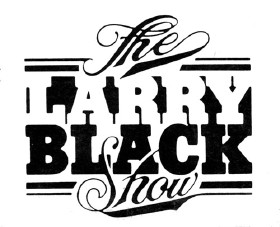 I mentioned at the end of my segment about The Scott Ross Show that in the latter part of 1976, the show was not often being hosted by Scott. He was actually getting tired of doing the show week after week, and began to look for someone else to host the show. And high on his list of choices was Larry Black.
I mentioned at the end of my segment about The Scott Ross Show that in the latter part of 1976, the show was not often being hosted by Scott. He was actually getting tired of doing the show week after week, and began to look for someone else to host the show. And high on his list of choices was Larry Black.
Larry was called at his studio at WAXC by Scott Ross, who asked him to come back to Ithaca and Love Inn to do the show. Despite taking a cut in salary, Larry felt that it was the right decision to work on the show. However, his wife Luann was not so enthusiastic. Larry jokes that she was so reluctant to leave on this venture that when they made the move in October 1976, her fingernails made grooves in the pavement all the way from Rochester to Ithaca.
During the latter part of 1976, Larry took over the hosting responsibilities on The Scott Ross Show. Here are some airchecks of Larry doing his job as substitute host:
During the weeks while he was acting as substitute host, Larry came across a new Christian album recorded by Gary S. Paxton. This album, The Astonishing, Outrageous, Amazing, Incredible, Unbelievable, Different World of Gary S. Paxton, impressed Larry. He stated on the show, “The man’s music amazes me.” He interviewed Paxton on the show, and later hired him to work on the jingles for the new show that would bear his name. ((One of the singers for the jingles was Janie Fricke, who later become a country star with the Grand Ole Opry)).
A New Name And A Renewed Focus
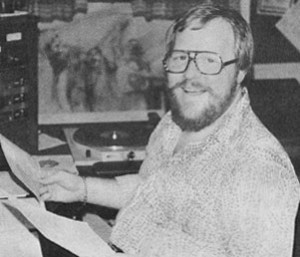
In early 1977 it was announced in Free Love that Larry Black was taking over the show permanently, with Alan Belknap functioning as producer. Not only would Larry be the new full-time host, but the show’s name was to be changed as well. The Larry Black Show now took the place of the former show, and the format remained almost completely the same. One change that Larry did make was to start including on the playlist some non-Christian music from the current top 40 charts. In the July-August issue of Renaissance (the new name for the Free Love newspaper), he stated it this way:
A recent polling of my mail indicates that the question most frequently asked this month is not, “Why should the devil have all the good music,” but, “Why should you play any of the devil’s music?”
… Let me clarify where the Larry Black Show is coming from … God has asked us to be “proclaimers” of His Good News on rock and roll radio stations. Our commitment to those radio stations is that we will play some of their music if they will give us air time to play some of our music. At present, forty percent of all the music played [on the show] is from the current Top 40 list, with the remaining sixty percent coming from the new contemporary Jesus Music artists …
It’s my hope that the Christian community will catch a vision of what God is doing through the Larry Black Show on secular radio stations, and rather than criticize, would both prayerfully and financially support this evangelistic thrust.
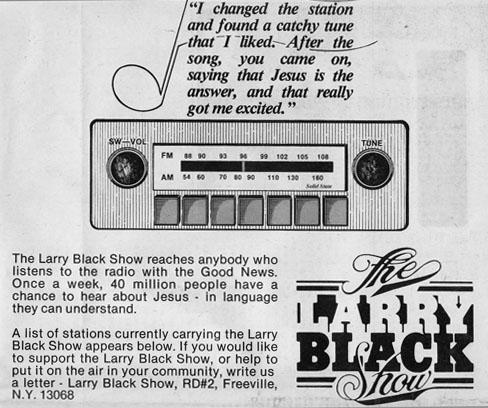
After getting used to this difference between the old show and the new show, I began to more and more enjoy the new host. He had very well spoken messages between the songs, many mini-lessons that would go along with the songs that he was playing. I also disagreed at first with the decision to include pop music along with the Christian music, since this show was virtually my only place to hear that type of music, and the top 40 music was available all over the place. But after I saw how he used the music and better understood the reason for it, I accepted the change.
Larry Black was on the air in Omaha in the same time slot as The Scott Ross Show had been, with one exception that the length of the show was reduced from three hours to two hours. In the third hour, WOW found another Jesus music radio show, Reality to fill the space.
Here are airchecks of Larry Black during 1977:
From 1977 to 1978, The Larry Black Show continued as a ministry of the Love Inn community at the farm in Freeville, New York. Renaissance continued to be the printed voice of the community, with articles that were focused on issues of false religions, the rise of homosexuality, and other social topics of the day.
Where, O Where Did Larry Black Go?
During 1978, the length of The Larry Black Show on WOW decreased from two hours to one hour, and in place of the second hour, WOW was playing a new show, Jesus Solid Rock. I also noticed that Larry Black was playing more “re-runs” than it had done in the past. Suddenly, I noticed that the show was no longer coming from Freeville, New York, but rather from Nashville, Tennessee. What had happened to the show?
After about eighteen months of doing the show from the studio at Love Inn, Larry was informed of a change. The leadership of the community had apparently decided that producing and distributing a Jesus music radio show was no longer something that they should continue to support. Their decision was that The Larry Black Show would be going off the air.
The Return Of Black
Bob MacKenzie was at this time the president of NewPax/Paragon (Gary S. Paxton’s record company). When told of the decision to terminate The Larry Black Show, MacKenzie urged Larry to continue it as a ministry separate from Love Inn. To make this happen, NewPax hired Larry as director of promotions and public relations for the company, in order to provide a salary for him to live on. Since NewPax operated out of Nashville, Tennessee, it was appropriate that he move to Nashville and do the show from there. Larry agreed to this plan, and within three months after production at Love Inn had ceased, a reborn Larry Black Show was ready to return to the airwaves.
Larry was able to do the show, live, at WKDF-FM, a rock station in the Nashville area. He recorded it and made it available to the stations that had previously aired the show. Since the FCC requirement to provide time for religious programming was still in effect, he was able to get it back on most of his previous “network”.
I do not know at what time exactly the change happened at WOW, when the new show from Nashville was aired. I do know that around 1983, changes were happening in the Omaha area radio landscape. WOW, had played Top 40 music in Omaha for several years. But the station made the decision to change their format to Country. I found one other AM station in the Omaha area that played Top 40 (gradually transitioning to just playing “oldies” all the time).
At some time after they made that change, they chose to discontinue playing Jesus music programs on Sunday morning. In tuning the FM radio dial, I found a station, KQKQ (also known as “Sweet 98”) where I could hear what little pop music I still liked. And I eventually happened to tune to this station on Sunday morning, and heard a familiar voice. Larry Black was back! And in stereo!
KQKQ played the show for a single hour, as WOW had been doing. However, the sound of the show was the same: He was still using the jingles that had been recorded at NewPax, and the format also was the same; a mixture of Top 40 and Jesus music artists, with commentary about the songs.
Here are airchecks of the show from 1980 to 1983:
Here are airchecks showing his use of pop songs:
In place of Renaissance magazine that Love Inn had published, Larry tried the LBS Magazine, although only a few issues were released. This included articles about Christian music and musicians. After that, he issued ministry updates in an occasional newsletter to those who wrote and requested it.
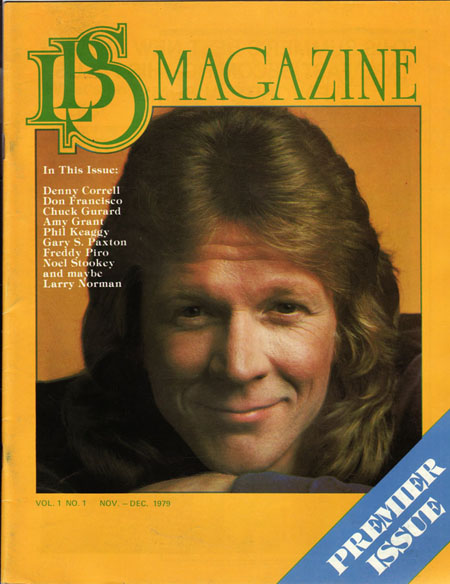
He always encouraged listeners to write, and if they had questions about Jesus or other issues of life, he promised that he would get an answer to them. He also asked listeners to write with prayer requests. He made use of his church in Nashville as a resource in helping to meet needs as part of this ministry. And, since it was a non-profit venture, he would also ask for donations to help support it. But unlike many “radio preachers”, Larry didn’t do his fund raising in a begging or “we’re going to go off the air if you don’t help soon!” fashion. He made it known that the ministry needed support, but also qualified his request by inviting his listeners to just ignore that if they didn’t like hearing a request for money.
To help with support of the show, Black tried various approaches. One of the copies of the show I have from 1982 includes a commercial for Carnival Fun Ships, not much different from what would have been heard on other radio programs. Also, during 1980-81, he tried offering a service called SONUS, in which he offered selling Jesus music records to listeners who could not find them locally. (Black does not think he got many inquires to this offer, as he does not recall doing it for very long). Here is one of his commercials for SONUS:
At its peak, Larry’s show was carried on about 125 stations across the country. He continued to record and distribute his show for seven years, until the final shows were mailed out in 1985, at which time he closed down the ministry. He was getting a little weary of doing the show after so many years, and it was also at about this time that the FCC’s “must carry” rule was no longer in effect, due to deregulation in the radio industry. This was beginning to limit the number of stations available to play the show. So it just seemed like a good time to conclude this part of his life.
That Radio Show
Back in 1982, Larry Black made an effort to participate in the emerging Christian radio market with a countdown show which he entitled That Radio Show. Christian stations were interested in the kind of show he did, but didn’t want the top 40 music that was included on The Larry Black Show.
The style on the show was less evangelistic than The Larry Black Show, but otherwise was very familiar. In Omaha it aired on a Christian station, KCRO 660 AM. I have very little recorded from this particular program, as it was not on the air at a time that was convenient for me to consistently be able to hear it. In this show he included more discussion about the songs, the song writers, and the performers of the music than he had time to do on his other radio program.
After The Larry Black Show
From the point of view of a listener, it is common to identify a personality only with the venue in which you see or hear him. What is easy to forget is that this person has to make a living, pay the mortgage, send the kids to college, and save for retirement. If he (or she) is doing a ministry like the shows I’ve been discussing, it will likely be done with no compensation to allow it to be a full-time job.
About eighteen months after Larry stopped doing his syndicated show, he went to work at WSM, 650 AM, in Nashville. This station was one of the first “country music” stations in the United States, and was famous for its connection to the Grand Ole Opry. Larry started working weekends and filling in on vacations of the existing on-air DJs. The station management liked him well enough that they agreed to hire him full time to work on the morning show. They hired a woman whose first name was Liz, changed her last name to “White”, and the show was called “Black and White In The Morning“. They had a real chemistry together on the air, and the show was quite successful.
During the time when Larry was doing the morning show at WSM, opportunities came up for him to do television commercials. He became more in demand for this type of work, and ultimately attended a casting call for the movie Ernest Goes To Camp, in which he was given the role of the camp owner. For the entire time it was being filmed (in Tennessee), Larry would do his morning show at WSM with Liz White, and then drive thirty minutes to the movie set for a day’s work on that project. The movie appeared in theaters in the spring of 1987.
After about two and a half years of doing the morning show with Larry at WSM, his co-host Liz White moved on to New York, and WSM decided to try someone else for the morning show. Larry continued to pursue roles in movies and television, and landed a number of parts (see his entry in the IMDb database.) His roles included a part in another movie, Ernest Scared Stupid, a few episodes of the TV series In The Heat Of The Night between 1989 and 1993, and a part in October Sky in 1999.
During the time that Larry was involving himself in acting, WSM was having a little difficulty in creating another morning show that worked well, so the station asked him to return. He agreed to do this, as long as he could continue to leave when necessary to work in these acting roles. The station accepted this condition, and Larry Black returned to WSM.
Gabriel Communications
By around 1993, Larry decided it was time to do some work that did not involve the early mornings of his radio show at WSM. Instead, he focused himself on other projects, including a daily and a weekly television show in Nashville, as well as continuing to do commercials for TV and radio. One of his projects involved doing Country Music Spotlight from Branson, Missouri as a program on The Family Channel. This program ran from 1993 to 1995.
After doing the spotlight show, Larry came up with the idea of doing a show where country music artists would sit together and reminisce with each other about their careers and the music they had played. In 1996 he started a new company, Gabriel Communications, in order to make this happen. Through his contacts in the country music industry, he gathered together a number of legendary performers, and videotaped their conversations. The first Country’s Family Reunion project was sold in 1997 through exposure on The Nashville Network (TNN), airing after the Grand Ole Opry show. It did quite well, quickly paying for the cost of producing the videos. Later, Gabriel Communications made use of television “infomercials” to advertise the product in other markets. Ultimately the success of this led to other Reunion projects about bluegrass music, the Grand Ole Opry, and rock and roll legends.
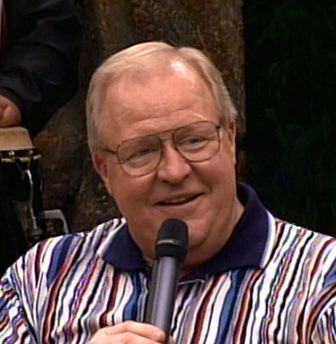
In 2003, Larry successfully applied the Reunion concept to sports, and created videos involving the legends of stock car racing and football teams from Georgia, Auburn, and Alabama.
Today, Larry Black is still living in the Nashville area with his wife Luann, and continues to work on television and production projects. His latest project is a television program for RFD-TV, “Larry’s Country Diner“, which features Larry as the owner of a country diner, which is visited by a number of famous country music personalities and groups, who are glad to talk with him and perform a song or two. Larry’s Country Diner debuted in September 2009, and will be continuing into the spring of 2010. You can follow the program on Facebook here.
The Impact Of The Larry Black Show
My enjoyment of music during the 1970s and 1980s was not just about the music, but it was also about the DJs that played the music. These talented people did more than just play the records; they also entertained the audience with their patter over the beginning and end of songs, and between the songs. I enjoyed this during high school, with WLS in Chicago, and during college, with WOW and KOIL in Omaha. Another station that had started up in Omaha during my college years, KGOR, was a fine source for Top 40 music in stereo, but it was rather uninteresting to listen to, since it played pre-recorded announcements of the song title and artists, but had virtually no on-air announcers.
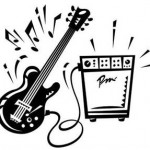 When my attention turned to Jesus music, it was again not just the music, but the DJ talking about and between the music that made it enjoyable. And with The Scott Ross Show, The Larry Black Show, Reality, and Jesus Solid Rock, the announcers for these shows really made the difference. During my time of listening to Jesus music, I found that the source most influential to me was The Larry Black Show. I would imagine that this was partly because of the long duration of my exposure to the show (from 1976 to 1985), and certainly due to his personality and the words he said. I suppose that, in a sense, he was a “rock and roll radio pastor”, in addition to my actual local pastor.
When my attention turned to Jesus music, it was again not just the music, but the DJ talking about and between the music that made it enjoyable. And with The Scott Ross Show, The Larry Black Show, Reality, and Jesus Solid Rock, the announcers for these shows really made the difference. During my time of listening to Jesus music, I found that the source most influential to me was The Larry Black Show. I would imagine that this was partly because of the long duration of my exposure to the show (from 1976 to 1985), and certainly due to his personality and the words he said. I suppose that, in a sense, he was a “rock and roll radio pastor”, in addition to my actual local pastor.
While the show was on the air, I financially supported few ministries outside of my home church. But one that I was very willing to help with was Larry Black’s radio ministry. His care and sincerity was an important encouragement to me to continue to improve my relationship to God. And since I taped bits and pieces of his show to get the music he played, I also got the benefit of his words, and to this day I continue today to receive from what he did 20 to 30 years ago.
A letter that Larry sent out to supporters at one point indicated that there were still outstanding bills from the show that had not been paid, even after it went off the air. I gladly continued to contribute a small amount each month to Larry’s radio show mailing address, until he finally indicated that the show’s obligations had been met. In thanks for my assistance, he was kind enough to send to me a few copies of the vinyl LPs of the show that were sent out to the stations that played them. They are an important part of my Christian music collection today.
What I learned from listening to Larry Black was:
- remember to keep my focus on Jesus
- to not be afraid to openly tell people what I believe
- if I do tell people what I believe, do it in love, not to win an argument
- keep pointing back to Jesus
- be sure I’m not just talking about myself
His example has stayed with me for a long time, was likely an inspiration to me in the creation of this web site. Thanks, Reverend Black!
Addendum: As of 6/24/09, there are now copies of several Larry Black Show episodes available to download and listen to, by permission of Larry Black. Look in the Downloads section.
8/30/09 – I made a updated parts of the narrative where the change from Freeville to Nashville occurred, and when the change in Omaha from WOW to KQKQ happened.
2/6/10 – Found Larry’s date of birth, courtesy of his Facebook page. Also added info about his Country Diner television series.
6/11/10 – You can make contact with Larry by going to his web site at Larry’s Country Diner.
Next: Jesus Solid Rock